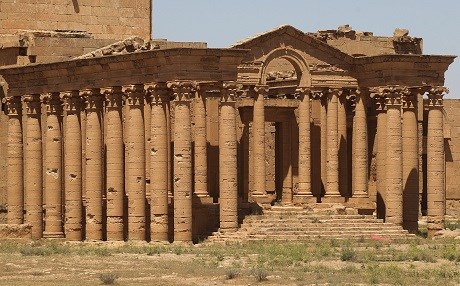“We will declare a complete control over Mosul in the coming days,” said Abadi, adding that government is working to reconstruct Iraq’s heritage sites especially, al-Hadba Minaret, and the ancient city of Hatra and Nimrud, which suffered destruction at the hands of the militant group.
The 845-year old al-Hadba Minaret was destroyed on Wednesday. Iraqi and coalition forces reported that ISIS blew up the historic mosque and minaret. The militant group claimed that a coalition airstrike was responsible for the destruction.
Abadi earlier on Thursday in a tweet described the act by ISIS as a “formal declaration of defeat” in Mosul and Iraq.
Al-Hadba minaret, a treasured landmark in Mosul, was nicknamed the hunchback by Iraqis because of its precarious tilt. The extremist group simultaneously blew up Al-Nuri mosque, the place where ISIS leader Abu Bakr al-Baghdadi declared his so-called caliphate on July 4, 2014, naming himself “caliph,” leader of the whole Islamic world, seeking to found a new Islamic regime.
Nimrud, the ancient Assyrian city 30 km south of Mosul was liberated by the Iraqi army in early November 2016, with it revealed the scale of the damage ISIS militants inflicted in 2015.
The Shiite paramilitary force of the Hashd al-Shaabi declared in late April it had fully liberated the town of Hazar, or Hatra, south of Mosul.
Hatra is a UNESCO World Heritage-listed site that ISIS is said to have destroyed it.
The town is a strategic conjunction connecting the three Sunni-dominated provinces of Nineveh, Salahaddin and Anbar.
Hatra had fallen to ISIS when the group swept across Iraq in a blitzkrieg in June 2014.

This picture shows the UNESCO-listed ancient city of Hatra, south of Mosul, on Thursday. The ancient city is one of the heritage jewels of Iraq and was damaged by IS after they took over large parts of the country three years ago. AFP/ Ahmad al-Rubaye
ISIS militants have demolished many other ancient sites in Nineveh including Yezidi and Kakai temples and Christian churches.
Speaking to reporters in the press conference, Abadi also hinted at his recent tour to the neighboring countries including Saudi Arabia, Iran and Kuwait, saying their visit had its significance as the three countries hailed Iraq’s role in its fighting front against terror, notably the Mosul war.
The Mosul offensive began on October 17, 2016 by the Iraqi security forces and supported by the Kurdish Peshmerga fighters, Hashd al-Shaabi paramilitaries, and the US-led international coalition to defeat ISIS.
Correction: an earlier version of the story reported that the ISIS leader declared his caliphate on June 29, 2014 in Mosul. While it is true that the caliphate was declared on that date, Baghdadi named himself in the al-Nuri mosque a caliph or the leader of Muslims on July 4, 2014 in Mosul as he led Friday prayers.




Comments
Rudaw moderates all comments submitted on our website. We welcome comments which are relevant to the article and encourage further discussion about the issues that matter to you. We also welcome constructive criticism about Rudaw.
To be approved for publication, however, your comments must meet our community guidelines.
We will not tolerate the following: profanity, threats, personal attacks, vulgarity, abuse (such as sexism, racism, homophobia or xenophobia), or commercial or personal promotion.
Comments that do not meet our guidelines will be rejected. Comments are not edited – they are either approved or rejected.
Post a comment